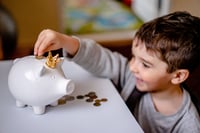Blog
Insights, advice and practical tips from the largest online tutoring community.
Recommended articles
Parent Mental Health Day: Tips to Protect Your Own Mental Health
- January 26, 2023
- In PARENTING
- 7 min read
If you're a parent, it's important not to forget to prioritise your own mental health. Here are some tips to help you protect your mind.
Help Your Kids Pack Their School Bags: Top Tips and PDF Checklist
- September 6, 2022
- In PARENTING
- 6 min read
Do your kids keep forgetting things for school? Here are our tips to help them pack their school bags so they're ready for the day ahead
18 Ways to Make their First Day of School Perfect
- August 26, 2022
- In PARENTING
- 10 min read
Their first day of school should be a special one. Click here to check out our 18 essential tips to make sure everything goes smoothly.
Everything You Need to Know About the EPQ: Full FAQ
- August 18, 2022
- In PARENTING
- 14 min read
With the potential for 28 extra UCAS points, the EPQ can be make or break for some universities. Read our guide for the extended project qualification
Back to School Clothing & Footwear Allowance 2022 (BTSCFA)
- August 16, 2022
- In PARENTING
- 9 min read
The Irish back-to-school clothing and footwear allowance helps to cover the cost of uniforms and footwear for eligible Irish school children. Read on to find out if you qualify and how much you could receive.
Editor's choice
International Day of Education: Why Should We Care About It?
- January 18, 2024
- In TRENDING
- 5 min read
Read on to find out more about The International Day of Education, what it is, who it affects, and why you and everyone you know should care about it…
Advice From a Teacher: How Can I Help My Child If They Fail Their Mock Exams?
If your child has failed their mock exams and is feeling overwhelmed, here's some advice from a teacher on how to support them the right way.
What Are Mock Exams and Why Are They Important?
With exam season fast approaching it’s key that your child gets things right in their mock exams. Let us guide you through this all important step.
Everyday Activities to Teach Your Child Financial Literacy
- April 3, 2023
- In TRENDING
- 8 min read
From investing to banking, and saving to budgeting skills, we need to step up and adopt everyday activities to teach our children financial literacy.
AI and the Future of Education
- April 3, 2023
- In TRENDING, Learning With Technology
- 9 min read
As a company that helps students learn with tailor-made tutoring in virtual classrooms, GoStudent seeks to understand how young people see education today. Join us and learn more!



















